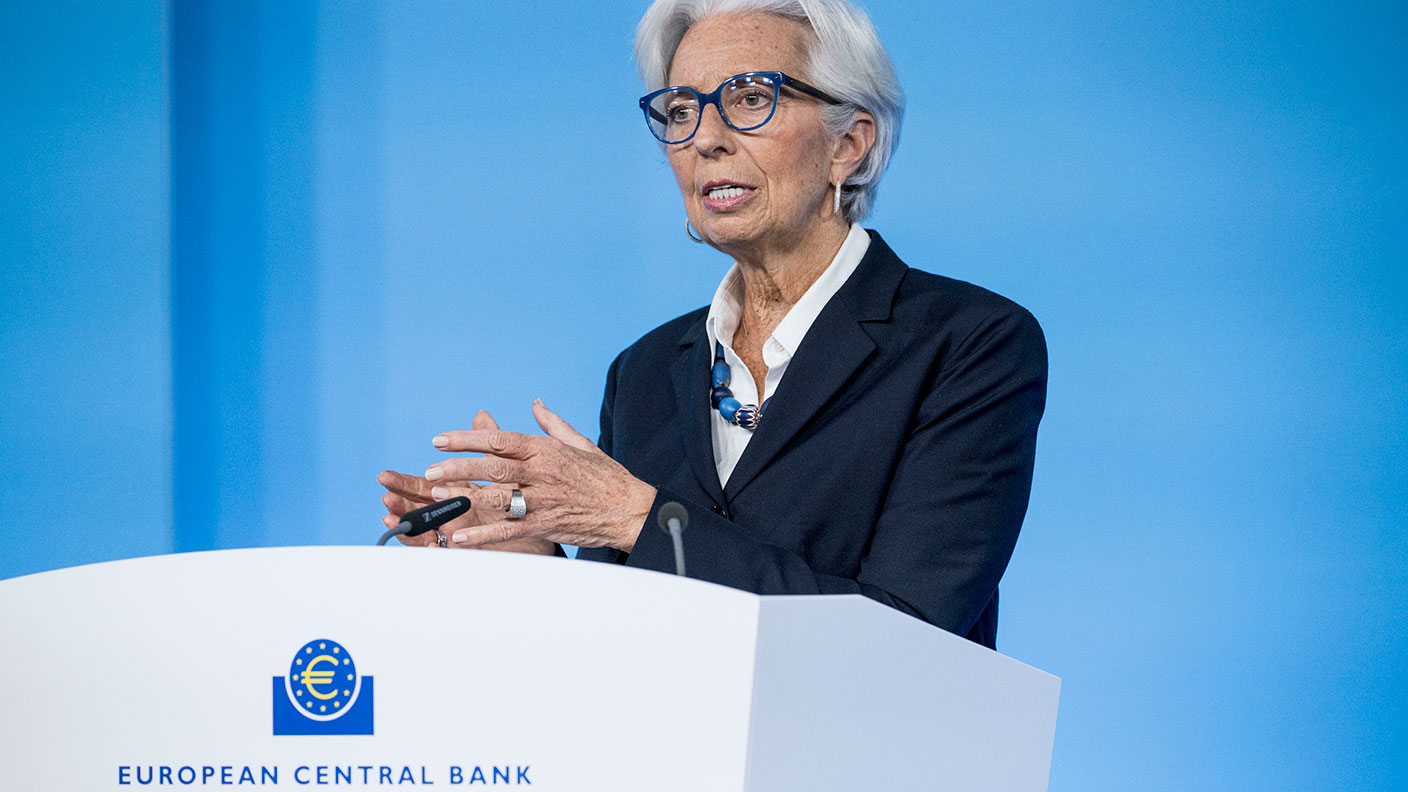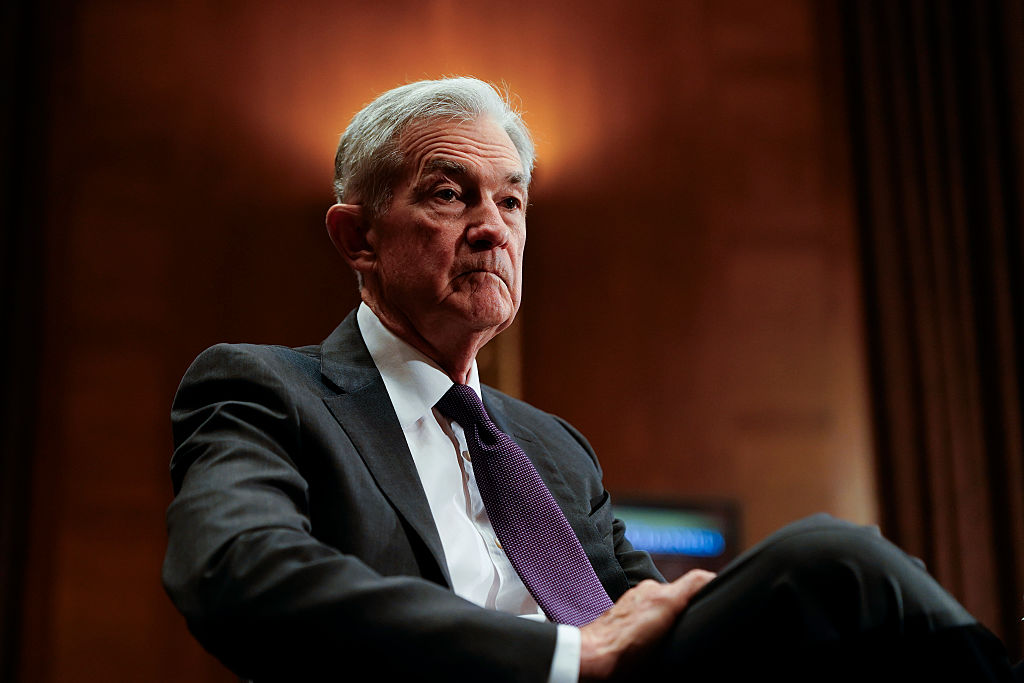Nature is healing – government bond yields are turning positive again
Negative bond yields are finally coming to an end as central banks change tack. But can the markets cope? John Stepek looks at what might come next.


Get the latest financial news, insights and expert analysis from our award-winning MoneyWeek team, to help you understand what really matters when it comes to your finances.
You are now subscribed
Your newsletter sign-up was successful
Want to add more newsletters?

Twice daily
MoneyWeek
Get the latest financial news, insights and expert analysis from our award-winning MoneyWeek team, to help you understand what really matters when it comes to your finances.

Four times a week
Look After My Bills
Sign up to our free money-saving newsletter, filled with the latest news and expert advice to help you find the best tips and deals for managing your bills. Start saving today!
Years of emergency monetary policy – of interest rates near zero and rampant money printing by central banks – have created plenty of notable distortions in the markets.
Perhaps the plain weirdest of these distortions was the phenomenon of the negative bond yield.
The good news is that this aberration is now dwindling away. Nature, as they say, is healing.
MoneyWeek
Subscribe to MoneyWeek today and get your first six magazine issues absolutely FREE

Sign up to Money Morning
Don't miss the latest investment and personal finances news, market analysis, plus money-saving tips with our free twice-daily newsletter
Don't miss the latest investment and personal finances news, market analysis, plus money-saving tips with our free twice-daily newsletter
The big question now is – can markets cope?
Negative-yielding bonds are vanishing fast
Bonds are a type of IOU. If you lend me money, you’d expect something in return for that – that something would be interest.
The exact amount of interest you want would be based on several factors, but the main ones include: a) how long I borrowed the money for; b) how much you think you can trust me to pay it back; c) the sorts of rates you could get by lending to other people or sticking your money in the bank.
What you probably wouldn’t see as a good – or even valid – deal, is you lending me £100, on the condition that I paid you back £99 at the end of the term.
And yet, that’s the deal that many investors have accepted to with investment-grade bonds (mostly, but not entirely, government bonds) over the last five years or more (you can read more about why anyone would buy a negative-yielding bond here).
Negative-yielding bonds started to become a major phenomenon in around 2014, then spiked (with the Brexit vote, and related – if confused – concerns over the eurozone) in 2016.
Everything started to calm down, particularly as the Federal Reserve, America’s central bank, started raising interest rates in 2018. But then China’s growth scare kicked in, the Fed reversed course and the volume of negative-yielding debt hit a new high in late 2019. Then Covid came along and we got another fresh record high of more than $17trn in late 2020.
But now we’re back to that 2018 low, at around $7.7trn and falling. The most eye-catching evidence is from the German Bund market. As recently as last week, if you’d decided you fancied lending money to the German government over ten years, you’d have had to pay them for the privilege.
Yet today, you’ll get paid more than 0.15% a year. A bargain, I’m sure you’ll agree. Even more strikingly, if you’d bought the five-year bond at the right time this morning, you’d have bagged the princely yield of 0.032%.
In other words, the German government is finally having to pay to borrow money again.
What’s changed? There are the obvious pointers: inflation is rocketing across the globe; no one is terribly happy because living costs are surging, and you can certainly debate what happens next, but at the same time, unemployment is low and most economies are seeing strong growth.
So even those investors who are most fearful of deflationary collapse are perhaps revising their views.
Central banks are getting much more aggressive – but for how long?
But of course, there’s a much more obvious driver of negative interest rates which has gone away. It’s the same thing that drove the spikes in 2016 and the slide in 2018.
When central banks are printing money to buy government debt, it’s a no-lose proposition. You can buy a load, and then flip it to the central bank, and make a guaranteed profit. In other words, you aren’t hanging around to actually pay the negative rate.
This is ending. Yesterday the Bank of England both raised interest rates and stopped its money-printing programme. The Bank’s tone surprised some people (not to mention governor Andrew Bailey’s somewhat baffling plea that people should avoid asking for pay rises, even as he was outlining just how bad the cost-of-living squeeze is about to get – if anything points to a wage-price spiral happening, it’s this sense of official panic).
However, even more surprising for markets was the European Central Bank’s change of tone.
The ECB didn’t actually change interest rates or its money-printing programme, but in the press conference afterwards, Christine Lagarde, the ECB president, made it very clear that the bank is no longer erring on the side of economic caution. In fact, it’s now worried about inflation.
Long story short, before Lagarde spoke, markets had been betting that the ECB would not move interest rates at all (or only once) this year. After she sat down, that expectation had shifted to four interest-rate rises. That’s a big change.
Have inflation prospects changed so much in such a short period of time? Of course not. But now that the Fed is being more punchy on inflation, and now that it’s a headline-grabbing issue, the other central banks can’t ignore it.
The idea that they can do anything about soaring energy prices is facile, but to admit this would be to admit that, in fact, central banks don’t really have the sort of control over what’s laughably described as the economic “machine”, as they’ve been credited with over the last couple of decades or more.
Anyway – why does all of this matter to you as an investor? Well, on the one hand, higher interest rates – assuming they don’t create a recession – should be good news for banking stocks and their profit margins. So that’s your share tip side of things taken care of.
On the other hand, it does raise the question of what happens as all of these countries start finding their interest bills going up. For example, the eurozone crisis feels way back in the mists of time now, but we shouldn’t forget that one key function of ECB money printing has been to keep interest costs down for “periphery” eurozone countries.
I don’t think we’ll see a 2010-style crisis there again. But at some point, investors might start getting edgy about lending to the likes of Italy. It’s probably worth keeping an eye on the spread (the gap) between the yield on German bunds and that on other eurozone nations’ debt.
When push comes to shove, there’s a good chance that central banks are at some point going to have to choose between pretending to tackle inflation and keeping a lid on unsustainable borrowing costs.
That’ll be something to watch.
Get the latest financial news, insights and expert analysis from our award-winning MoneyWeek team, to help you understand what really matters when it comes to your finances.

-
 Should you buy an active ETF?
Should you buy an active ETF?ETFs are often mischaracterised as passive products, but they can be a convenient way to add active management to your portfolio
-
 Power up your pension before 5 April – easy ways to save before the tax year end
Power up your pension before 5 April – easy ways to save before the tax year endWith the end of the tax year looming, pension savers currently have a window to review and maximise what’s going into their retirement funds – we look at how
-
 How a dovish Federal Reserve could affect you
How a dovish Federal Reserve could affect youTrump’s pick for the US Federal Reserve is not so much of a yes-man as his rival, but interest rates will still come down quickly, says Cris Sholto Heaton
-
 'Investors should brace for Trump’s great inflation'
'Investors should brace for Trump’s great inflation'Opinion Donald Trump's actions against Federal Reserve chair Jerome Powell will likely stoke rising prices. Investors should prepare for the worst, says Matthew Lynn
-
 The challenge with currency hedging
The challenge with currency hedgingA weaker dollar will make currency hedges more appealing, but volatile rates may complicate the results
-
 Will Donald Trump sack Jerome Powell, the Federal Reserve chief?
Will Donald Trump sack Jerome Powell, the Federal Reserve chief?It seems clear that Trump would like to sack Jerome Powell if he could only find a constitutional cause. Why, and what would it mean for financial markets?
-
 Can Donald Trump fire Jay Powell – and what do his threats mean for investors?
Can Donald Trump fire Jay Powell – and what do his threats mean for investors?Donald Trump has been vocal in his criticism of Jerome "Jay" Powell, chairman of the Federal Reserve. What do his threats to fire him mean for markets and investors?
-
 Freetrade’s new easy-access funds aim to beat top savings rates
Freetrade’s new easy-access funds aim to beat top savings ratesFreetrade has launched an easy-access exchange traded fund (ETF) range - here’s how the ETFs work and how they compare to the savings market
-
 Go for value stocks to insure your portfolio against shocks, says James Montier
Go for value stocks to insure your portfolio against shocks, says James MontierInterview James Montier, at investment management group GMO, discusses value stocks and slow-burn Minsky moments with MoneyWeek.
-
 Halifax: House price slump continues as prices slide for the sixth consecutive month
Halifax: House price slump continues as prices slide for the sixth consecutive monthUK house prices fell again in September as buyers returned, but the slowdown was not as fast as anticipated, latest Halifax data shows. Where are house prices falling the most?